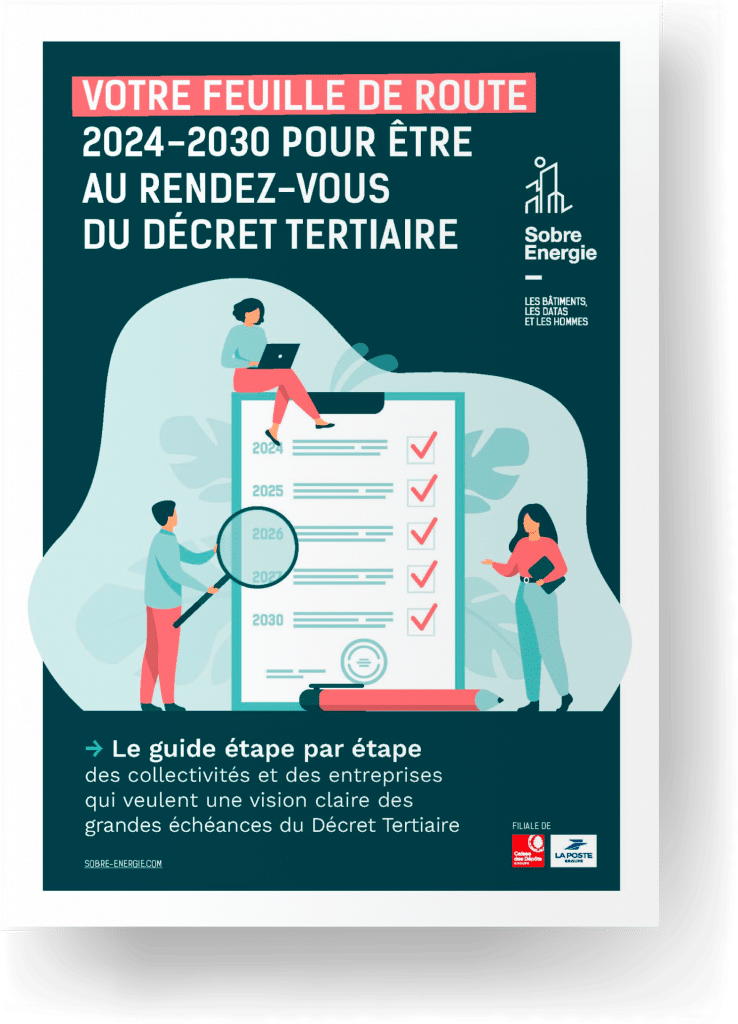Le secteur du bâtiment représente près de 47 % des consommations énergétiques en France et génère 17 % des émissions directes de gaz à effet de serre. Face à ce constat, il devient impératif de repenser la manière dont les bâtiments tertiaires sont gérés et rénovés. Le Dispositif Eco Energie Tertiaire (DEET), en vigueur depuis 2019, a pour objectif de réduire drastiquement la consommation énergétique des bâtiments tertiaires de plus de 1 000 m².
En parallèle, les labels BBC Effinergie encouragent des rénovations ou des exploitations à haute performance énergétique mais adoptent un référentiel bien plus large qui intègre des critères environnementaux, d’optimisation de la phase de chantier, d’optimisation de la consommation d’eau ou des déchets par exemple. La démarche du DEET est focalisée sur la gestion de l’énergie en phase d’exploitation. Ce qui est inédit, c’est que le DEET apportera fin 2024 au marché une transparence avec une notation dont l’impact se rapprochera certainement des labels très recherchés par les assets managers pour valoriser leur patrimoine en gestion, mais uniquement sur la base du critère énergétique de l’intensité de consommation surfacique (en kWh par m2 par an).
Les détenteurs de bâtiments s’orientent de plus en plus vers des certifications comme le label BBC Effinergie afin de valoriser leur patrimoine. Les bâtiments déjà certifiés BBC, grâce à leurs faibles consommations énergétiques et à leur conception durable, ont une longueur d’avance pour atteindre leur mise en conformité avec les exigences du décret tertiaire.
Comment ces certifications deviennent des atouts stratégiques pour les propriétaires souhaitant à la fois valoriser leur asset et respecter les réglementations en vigueur ?
Le décret tertiaire : des objectifs de réduction progressive des consommations énergétiques
- 40 % d’ici 2030,
- 50 % d’ici 2040,
- 60 % d’ici 2050 (par rapport à une consommation de référence).
Deux approches sont possibles pour se conformer à cette réglementation :
- Réduire la consommation énergétique en valeur relative : comparée à une année de référence, avec des objectifs exprimés en pourcentage en réduction.
- Atteindre une consommation énergétique en valeur absolues : fixée en fonction du type d’activité, de la localisation géographique et de l’intensité d’utilisation des bâtiments.
La Rénovation BBC : un atout pour la conformité au décret tertiaire
Le label BBC (Bâtiment Basse Consommation), créé en 2009, est un cadre de référence pour les rénovations à haute performance énergétique. En s’appuyant sur une approche globale, il permet de réduire significativement les consommations d’énergie, tout en améliorant le confort et la valeur patrimoniale des bâtiments.
La rénovation BBC : comment ça marche ?
La rénovation BBC repose sur des principes clés, en lien direct avec les objectifs du Décret Tertiaire :
- Optimisation de l'enveloppe thermique : Isolation performante des murs, toitures et planchers pour réduire les déperditions d'énergie.
- Réduction des fuites d’air : Améliorer l’étanchéité à l’air pour limiter les pertes thermiques parasites.
- Installation d’équipements performants : Systèmes de chauffage, ventilation et climatisation (CVC) efficaces et adaptés, souvent basés sur des solutions thermodynamiques ou des raccordements à des réseaux de chaleur.
- Gestion intelligente de l’éclairage et des systèmes énergétiques : Introduction de systèmes de gestion de l’énergie (SGE) pour optimiser les consommations liées à l’éclairage, la production d'eau chaude et la ventilation
Ces rénovations améliorent l'étanchéité à l'air, l'efficacité énergétique et le confort des occupants tout en réduisant les coûts d'exploitation à long terme. Elles anticipent même les obligations du décret BACS liées à la mise en place d’un système de Gestion Technique du Bâtiment.
Compatibilité entre la rénovation BBC et les exigences du DEET
La rénovation BBC permet non seulement de réduire les consommations énergétiques de manière substantielle, mais aussi de respecter les objectifs du DEET à court et long terme. Les *travaux de l’Observatoire BBC d’Effinergie montrent qu’un investissement de 440 €/m² SRT (surface thermique au sens de la réglementation thermique) en moyenne pour un bâtiment de bureaux et 530€/m² SRT pour les bâtiments d’enseignement permet d’atteindre des réductions énergétiques significatives. De plus, les projets rénovés selon le label BBC ont démontré leur compatibilité avec les exigences du Décret Tertiaire :
- D’après les chiffres du CEREMA et d’Effinergie, 62 % des bâtiments de bureaux rénovés BBC sont conformes aux objectifs de réduction de -40 % d’ici 2030.
- Avec des ajustements sur les usages énergétiques, ces taux de conformité peuvent encore être améliorés à horizon 2040 et 2050.
Parmi les bâtiments d’enseignement rénovés BBC, 92% sont conformes à l’exigence du décret tertiaire en valeur relative à horizon 2030. Ces établissements scolaires peuvent bénéficier d’un financement dédié à la rénovation des bâtiments avec le programme EduRénov.
EduRénov, un programme de la Banque des Territoires, cible les collectivités pour la rénovation énergétique des bâtiments scolaires. Il offre conseils et financement pour des projets garantissant au moins 40% d'économie d'énergie. Cette initiative offre une chance significative d'améliorer les établissements scolaires souvent vieillissants et énergivores, optimisant ainsi le confort des utilisateurs. Sobre Energie est partenaire de ce programme et intervient sur le volet audit énergétique.
Chez Sobre Energie, nous pouvons vous accompagner dans votre stratégie Décret Tertiaire et dans la priorisation de vos actions de performance énergétique :
- Suivre vos consommations sur vos EFA avec le module dédié sur notre plateforme DATAMARC
- Prioriser vos actions de performance énergétique avec nos audits digitalisés
- Pilotez vos actions avec le conseil de nos energy managers
Pour plus d’informations sur les labels EFFINERGIE :
Le BEE Tertiaire Rénovation de Prestaterre
Le BEE Tertiaire Exploitation de Prestaterre
